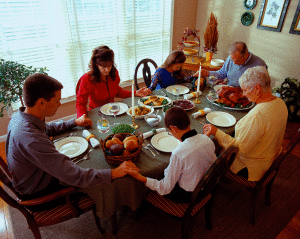 Whew! How many preachers are giving thanks for the alternate “Harvest Thanksgiving” lections this Sunday ? But can stories of wrath and judgment teach us to love a God who practices exclusion? Should we also be thankful for what is not around the table of the kingdom banquet?
Whew! How many preachers are giving thanks for the alternate “Harvest Thanksgiving” lections this Sunday ? But can stories of wrath and judgment teach us to love a God who practices exclusion? Should we also be thankful for what is not around the table of the kingdom banquet?
In some parishes the option to use the lections for “Harvest Thanksgiving” may be the cause of thanksgiving by preachers who thereby circumvent two rather difficult passages in the regular lections for this week (Proper 28). Namely, the golden calf incident and Jesus’ parable about rejecters of, and rejects from the Kings banquet.
Our Anglican inclination to be “inclusive” and our preference for a gentle god who is always nice to everyone are not reflected well in passages that ask “O Lord, why does your wrath burn hot against your people,” or that have Jesus talking about some being bound and thrown “into the outer darkness, where there will be weeping and gnashing of teeth.“
So what are we going to do with such readings? As much the lectionary seems to edit out a few such scriptures and as much as many of us tend to avoid preaching on them, is there a way we might be more “inclusive” even of those wrath and judgment passages that we fear will make God appear less than loving? What if these unsavoury passages help us think more rigorously about the logical implications and the different possible meanings of “being inclusive” and what real love requires? It would be ironic to exclude the very perspective that puts our endeavours to be inclusive in the context in which they have their deepest meaning.
We have talked so much talk about how our churches need to be inclusive that perhaps we have forgotten that the kingdom that Jesus preached remains essentially exclusive. Is it possible that our notion of being inclusive is a bit naïve because we assume: 1) that everyone actually wants to join us, and 2) that everyone who does really wants to honour Jesus rather than the golden calf? At this point I may be like “a fool rushing in”, but I hope to make a modest suggestion: that we can interpret and preach such difficult passages, in light of the philosophical necessities of good and evil. I realize this little excursion into philosophy won’t give me space to get back to the texts themselves, but perhaps some of the rest of you might go there.
The careless way that terms like “harmony” are used in new-age spirituality may be misleading when it comes to understanding love between persons rather than just the interaction between forces . The very concept of harmony requires that disharmony is also a real possibility. Harmony by definition excludes disharmony. In order for a hospital to care for the sick it excludes from its environs those intent on harming or abusing the patients. In order for a classroom to serve learning, those intent on disrupting that goal are not welcome. Being sent to the principals office is actually an act of redemption both for the class and for the one who thereby has opportunity to amend their ways in light of the purpose of the class. If we envision a God who welcomes evil we no longer have a good and loving God. If we envision a world where evil is no different than good we are also deprived of a good and loving God. The only way to have a good and loving God is to have a God who distinguishes between good and evil and intends to exclude evil from good.
I think we are rightly concerned that no one should ever feel “rejected by God”. We might even say that one of the main reasons that the New Testament gospel is such good news is precisely because it provides acceptance of those who would otherwise be rejected. Jesus taught that far from being in the business of damnation, and rather quite explicitly to the contrary, God is in the salvation business (John 3:12-21). But Jesus also allows for the possibility that some might exclude themselves from that business.
At first thought love speaks only of attraction and acceptance, inclusion and unification, but ultimately if love is to be love, it also demands separation and exclusion. In order for love to seek the highest good for another, it must oppose that which harms or destroys the one who is loved. Evil people can be included in covenant and the kingdom but only by being redeemed and transformed so they are no longer evil. Indeed such seems to be the work of the Gospel: to bring and embrace redeemed sinners into the kingdom of God. I have no trouble believing Jesus can redeem Hitler, Stalin and Pol Pot but I do have trouble thinking that my intention to be inclusive of them invites them to continue their murderous ways in the kingdom.
Unless we want to live in an amoral universe where there is no difference between good and evil and where ethics are thereby not only irrelevant but impossible, then love requires the separation of evil and good. In order for love to truly and fully include and embrace, love will also exclude that which threatens to destroy that embrace. For this exclusive hope, illustrated in these stories, and expressed in the life, teachings, death and resurrection of Jesus we can be truly thankful.
